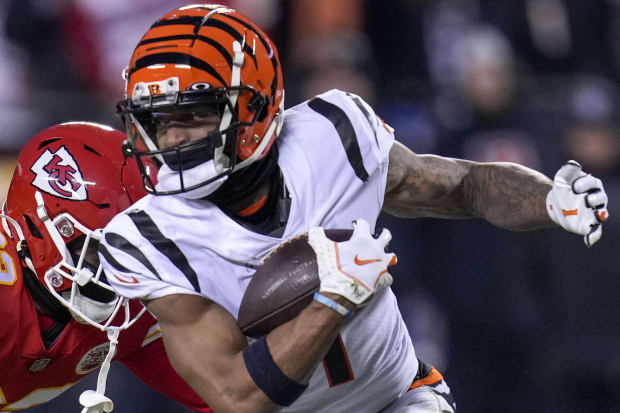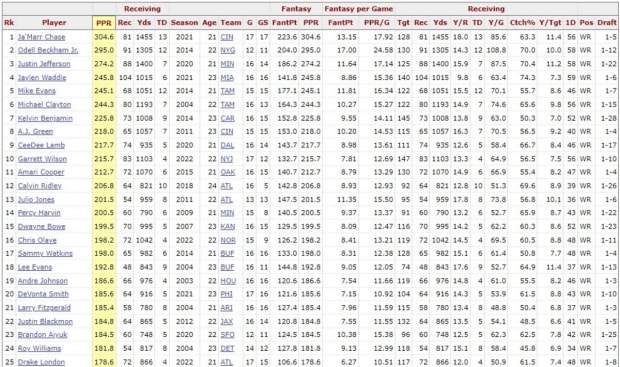The 2023 NFL draft is almost upon us, which excites both the real and fantasy fan bases across the globe. Over the years, the league has seen a major move towards wide receivers, especially in the first round. What proof? Well, since 2000, no offensive skill spot has been selected in Round 1 more often, and it’s not close. In fact, 94 have been picked in that time. Compare that to 66 quarterbacks, 51 running backs and 25 tight ends, and the position’s dominance is evident.
The question for our purposes is: How have the increased number of prominently drafted wide receivers fared in terms of fantasy production on an historical basis?
Well, I jumped in the fantasy DeLorean, got that sucker up to 88 miles per hour and looked at exactly that. Why? Because by looking at the past, we can find trends that can help us in the future. Since this focuses on just first-year players and their stats alone, you won’t see Josh Doctson, John Ross, Kevin White or Jameson Williams, who missed all or most of their rookie campaigns due to injuries.
So, without further ado, here’s what I found that can make you a better drafter.

Sam Greene/USA Today Sports
As I mentioned, 94 wideouts have been picked in the first round of the NFL draft in the last 23 years. Just one, Ja’Marr Chase, finished with more than 300 PPR points. Three (3%) scored over 250 points and 14 (15%) posted 200-plus points.
- Fantasy Rookie Success: : First-Round QBs | First-Round RBs
Those are very small totals, and certainly not as high as first-round running backs over the same period of time. But as you’ll see, more recent drafts have seen a far different (and more productive) result from what’s become a valuable position.
First, let’s look at the top 15 first-round rookie wide receiver seasons. Seven were selected in the top 10 in their respective drafts, and three others were picked in the top 17. That’s 67% of the top 15. The other five went between No. 22 (Justin Jefferson in 2020 and Percy Harvin in 2009) and No. 28 (Kelvin Benjamin in 2014).
Now, let’s look at things on a points-per-game basis.
Odell Beckham Jr. leads all first-year wideouts in our research with an average of 24.6 points per game. He’s the lone wideout to average over 20 points, though he did do it in 12 games as opposed to a full 16 contests. Two other wideouts, Chase and Jefferson, averaged over 17 points. In all, eight of the 94 first-round wideouts have averaged more than 15 PPR points per game. That’s a very meager 9%.
I used 15 points per game as a baseline because that’s how much a wideout would have had to average last season to finish in the top 12 (or to be considered a No. 1 fantasy receiver in a 12-team league). Four others were close, averaging more than 13.5 points per game. That would have qualified them as a No. 2 wideout in 2022.
What’s most interesting about the 12 first-round wideouts who have averaged 13.5 or more points as rookies is that five have come in the last three years. Those five are Chase (2021), Jefferson (2020), Brandon Aiyuk (2020), Jaylen Waddle (2021) and CeeDee Lamb (2020). (2020). Four others, including OBJ, Mike Evans, Benjamin and Brandin Cooks, all came in 2014 (or within the last nine of our 23 years).
As you can clearly see, more recent drafts have supplied us with more immediate impact makers in the stat sheets. Now let’s look at the three most recent drafts. In that time, 19 receivers have been selected in the first round. That includes Jameson Williams, who missed 11 games coming back from a knee injury.
Among the other 18 receivers, one (Chase) scored over 300 points and two others (Jefferson, Waddle) had more than 245. Lamb, who scored 217.7 points, would very likely have joined them, but his numbers fell when the Cowboys lost Dak Prescott after five games. Last season, we saw both Garrett Wilson and Chris Olave put up over 198 points. In all, nine of the 17 first-rounders who played in at least 10 games in the last three years have scored no fewer than 178 PPR points.
That’s a solid 53%.
What’s more, those nine players (in three years) make up 36% of the wideouts who have scored at least 178 fantasy points in the last 23 years! That includes 100% of the players who scored over 300 points (Chase), 67% of the wideouts with over 250 points (Chase, Jefferson) and 36% of the players who recorded over 200 points. As you can see, the move to first-round wideouts making big fantasy impacts is clear.

Looking ahead
Now let’s look at the incoming class of wideouts and see who might fit the bill for our recent historical trends. The top players, all of whom are projected to be taken in the first round, are Ohio State’s Jaxon Smith-Njigba, USC’s Jordan Addison, Zay Flowers of Boston College and Quentin Johnston from TCU. Jalin Hyatt out of Tennessee and North Carolina’s Josh Downs are also in the mix.
Based on the numbers we’ve seen in the last trio of seasons, whoever gets that first-round call should be on our redraft radars as potential middle to late rounders. The top option will likely be Smith-Njigba, though the rest could go in any order.
I found one final trend pertaining to Flowers, one of the top three projected wideouts. It has nothing to do with draft position or being a rookie, but his size. Flowers' official height at the NFL Combine was 5’9”, 182 pounds. Only three wide receivers in the Super Bowl era at 5'9" or shorter and 185 or lighter have had over 230 PPR points in a season: Mark Clayton (4 times), Mark Duper (2 times) and Gary Clark (4 times). That’s not a promising trend, and it’s one to remember in redrafts.
Regardless, Flowers and the other eventual first-rounders will all have added value in fantasy land based on what we’ve seen in the last three seasons. It’s now a wide receivers world, and even the youngsters are making a much bigger impact.







